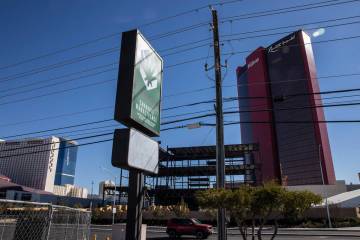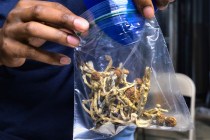Nevada marijuana industry growth has state scrambling to catch up
CARSON CITY — Nevada’s fledgling marijuana industry has taken off significantly faster than state officials anticipated.
Now state regulators are scrambling to catch up.
Nevada Legislature’s Interim Finance Committee on Wednesday approved approximately $1.3 million in new funding for the Nevada Department of Taxation to help bolster staffing and upgrade technology systems that the department’s executive director said are necessary to keep up with the ever-increasing regulatory demands.
Nearly all of that money comes directly from the marijuana taxes the department has collected since recreational sales kicked off last July, which started strong and have continued to surge far above expectations.
“Its pretty obvious that things have gotten off to a stronger start than what was anticipated,” Nevada Department of Taxation Executive Director Bill Anderson said during the IFC meeting. “It’s obviously strained our department and we’re taking proactive steps early on to meet those challenges.”
Through the first nine months of sales, the state collected roughly $49 million in marijuana taxes, which is slightly under what the state expected to bring in the full first year of sales.
Anderson told members of the finance committee that his department needs the injection of funds so that it can continue to properly regulate the marijuana industry that is slated to grow significantly in terms of licensed dispensaries later this year.
The new funding would go towards, among others things, hiring more than a dozen temporary staff members, developing a public service announcement to discourage pregnant woman from using marijuana and purchasing a new case management system for more efficient management and regulation of the more than 500 different marijuana licensees the department oversees.
Anderson also asked the finance committee to approve more than $800,000 to continue funding several other staff positions, including eight permanent positions and armed security for the department’s offices in Henderson, Carson City and Reno.
The need for armed guards, Anderson said, is because the marijuana industry still deals almost entirely in cash because federally insured banks do not let marijuana companies bank with them. That means the department has large sums of cash coming through its doors on a regular basis.
“That necessitated the need for security for both tax department workers as well as tax payers,” Anderson said.
All but one of the department’s funding requests were approved.
Assembly Mike Sprinkle, D-Reno, took issue with the request for $108,000 in funding that would have gone towards paying an outside contractor to look over the medical marijuana regulations and recommend any changes to ensure they are inline with the current recreational regulations.
Sprinkle said he believes that with the request for increased staff for the department, that work could be done internally.
“We’ve all seen how this industry that we’re working on has just really far more exceeded expectations,” Sprinkle said. “I think what you’re asking for here makes a lot of sense. I definitely agree with the notion that we could be that ideal that other states look at.”
The committee also approved the first transfer of marijuana tax money to the Distributive Schools Account, the state’s public education budget, to the tune of about $8.4 million.
Contact Capital Bureau reporter Colton Lochhead at clochhead@reviewjournal.com or 775-461-3820. Follow @ColtonLochhead on Twitter.























